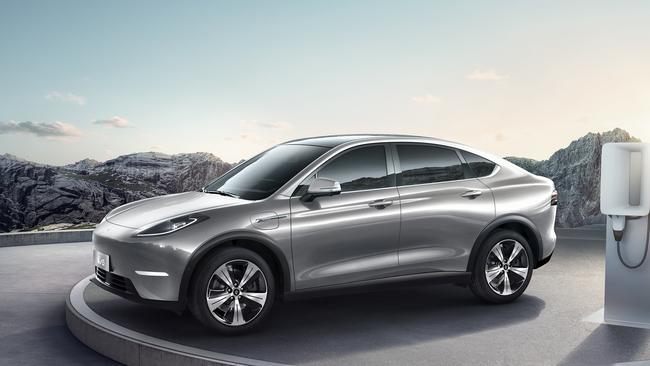Tesla-Style Rally Puts Chinese Electric-Vehicle Makers on Par With GM, Ford
China’s electric-vehicle makers have surged in value, boosted by bold national green-energy targets and individual investors.

China’s electric-vehicle makers have surged in value, boosted by bold national green-energy targets and individual investors hoping for a repeat of Tesla Inc.’s stunning performance.
American depositary receipts in NIO Inc., the best known Chinese company focused solely on electric vehicles, have jumped roughly 11-fold this year, lifting its market value to nearly $70 billion as of Wednesday, according to FactSet. In Hong Kong, shares of Warren Buffett-backed BYD Co., which produces hybrid electric- and gasoline-powered cars, as well as batteries, have more than quadrupled, valuing it at $69 billion.
The meteoric rises put these companies in line with large traditional car makers, such as General Motors Co. and Ford Motor Co., which had market values of $59 billion and $36 billion, respectively, on a fully diluted basis.
For now, though, most Chinese upstarts are unprofitable--and they are also selling far fewer vehicles than major automobile groups. Xpeng Inc., for example, delivered more than 14,000 cars in the first three quarters of 2020. By comparison, GM sold more than 1.9 million cars in China during the same period.
Tesla’s success has fed investor enthusiasm, as has China’s pledge to become carbon-neutral by 2060, said Elizabeth Kwik, investment manager for Asian equities at Aberdeen Standard Investments. “China is very serious about achieving this goal,” she said, citing President Xi Jinping’s personal endorsement.
To help cut carbon emissions, China aims for electric vehicles to make up 20% of car sales by 2025, and 50% by 2035. According to Principal Global Equities, those goals imply annual growth of 30% to 35% through 2025 in unit sales for what China calls new-energy vehicles, a category that includes hybrids, as well as battery- and fuel-cell-powered electric cars.
While the sector once relied heavily on subsidies to boost sales, investors and analysts say prospective buyers are now more focused on other issues, as cars have become cheaper and energy costs have come down. Tax breaks, longer driving ranges, and easier access to license plates-- which can be hard to get in the major cities--have also helped stoke demand. The government has cut the scope of an earlier subsidy scheme, but extended it for two years.
Drivers appear ready to go along. A recent CLSA survey of Chinese consumers found more than half of those planning to buy a new car would prefer to go electric, thanks to falling prices and improving quality, up from one-third of respondents in a 2018 poll.
As with Tesla, individual investors have helped fuel the rally. Thirty-four year-old Dennis Coyle, from Morris County, N.J., has bought more than $50,000 worth of stock in NIO since June, and said he has almost quadrupled his money. “There’s not much that would get me to sell right now,” said Mr. Coyle, who runs a landscaping business.
Ashar Qureshi, a 27-year-old product manager in Toronto, has bet on both NIO and Xpeng in recent months. His bets using options have netted him tens of thousands of dollars, and he holds close to $100,000 worth of stock in NIO, he said.
The run-up means Chinese EV stocks trade at high valuations, compared with near-term expectations for sales and profits. Li Auto Inc., for example, trades at an enterprise value--a measure that includes both debt and equity--of about 7.7 times expected sales in the next 12 months, according to FactSet, versus 1.1 times for GM.
For those lofty values to be justified, the companies will have to maintain rapid growth, while competing effectively with Tesla and big car manufacturers, both domestic and foreign. Principal Global said while the new-energy specialists would keep growing, valuations are already very generous, and likely factor in future expectations.
CLSA’s polling shows while Tesla’s Model 3 is popular in China, many prospective Chinese car-buyers favor domestic brands. “The local makers have a clear advantage in terms of producing relatively cheap and value-for-money cars compared to foreign brands,” said Ken Shin, the broker’s head of Asia energy research.
Fast take-up of electric cars in China made it a good time to consider investing, said Winnie Chwang, a portfolio manager at Matthews Asia. Still, she said the firm was mindful of intensifying competition, as conventional car makers broaden their electric offering. Xpeng was a Top 10 holding for the company’s Asia Growth Fund as of end-November.
Mr. Qureshi, the individual investor in Toronto, said he was reminded of dizzying price moves in cryptocurrencies. “I feel like I’m still trading crypto,” he said, “just because of the returns.” As with digital currencies previously, he said he saw signs of froth in electric-vehicle stocks, and was intending to use put options to hedge against potential losses. “I think it’s gotten a little bit out of hand, ” Mr. Qureshi said.
Dow Jones Newswires



To join the conversation, please log in. Don't have an account? Register
Join the conversation, you are commenting as Logout